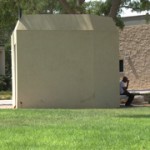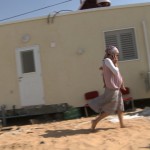By Marney Blom
Four kilometers from the Gaza border, the 850-person student body of Nofei Habsor high school in the southern Eshkol Regional Council of Israel live with the daily threat of incoming missiles.
Like it or not, they are a prime target of terrorist rocket fire from the Gaza Strip.
16-year-old Nofei Habsor student, Amiel Baldiga is apprehensive. “I [am] afraid when I go outside of my house – when I need to run a few meters to get into the shelters.”
On the periphery of Nofei Habsor, Nickey Levy, director of the region’s security, gave members of the foreign press a perspective of the imminent danger.
“On April 8, 2011, there was an attack. At around 11:30 am the kids were just about ready to go from school back home when the alarm sounded. Then they saw the mortar shells, just dropping and getting closer to school. Then [the terrorists suddenly changed their minds] and decided not to shoot at the school but at the [neighbouring] settlement.
To protect the Nofei Habsor High School staff and student body, the walls and windows of the school buildings have been re-enforced; tiny single-room safe houses have been erected and scattered throughout the school campus, between buildings. When the 15-second warning siren sounds, students either find refuge in a safe house, or stay in the school buildings. Remarkably, the threat of incoming rockets causes minimal disruption to classroom work.
Fifteen-year-old Maya Shalem says coping with the constant threat of attack has become a part of life. “[We’ve done it] since we were very young. You get used to it. It is normal. There is nothing you can do.”
Maya admits she’s afraid, but she adds, “I don’t want to move to another place, even [with the incoming] Kassam [rockets].”
Fifteen-year-old Shahir Tamir agrees.
“It’s my home. I can’t leave. It feels … like [it is] our duty to be here. It is [our] territory. If we won’t be here, than the Arabs will come here and shoot missiles on other places.”
Approximately twenty kilometers away, ten young Israeli families share the same deep-rooted conviction to occupy Israeli land along the border even if it means jeopardizing one’s safety. Fearlessly, Israelis intentionally build communities within 500 meters from the Egyptian border, clearly within missile range.
And there is no lack of applicants eager to move into this area. Twenty-two families have already signed up to live in the three-month-old community of Shlomit. At least 20 more families are on the waiting list.
Koby Revivo is a resident and spokesperson for the new community. “When I was a little kid it was said to us that it is very important that we [settle] in all the country.” Building homes along the Egyptian border makes a bold statement to Israel’s enemies.
However, with limited space and a safe room built into the side of each of the housing units, the trailer-like homes in Shlomit are considered temporary. “In a year, to a year and a half from now, we are going to build strong buildings,” says Revivo, “with … a lot of life, a lot of little children, a lot of voices laughing.”
At $230 a month, rent is cheap. Yet, a strong military presence in the community underscores the ever-present sense of danger that overshadows Israeli citizens living along the Israel-Egypt border.
The recent upsurge of terrorist attacks in southern Israel could make communities like Shlomit a target in the new front of hostilities against the Zionist state. Yet these Israelis see themselves as modern-day pioneers who are making a statement. They take the risks in stride and are there to stay.
Marney Blom is news director for the Acts News Network.
This article was originally printed September 21,2011.
Copyright 2011, Acts News Network.


